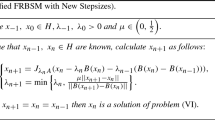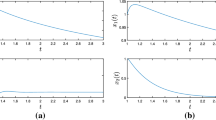Abstract
In this work, we propose a new algorithm for finding a zero of the sum of two monotone operators where one is assumed to be single-valued and Lipschitz continuous. This algorithm naturally arises from a non-standard discretization of a continuous dynamical system associated with the Douglas–Rachford splitting algorithm. More precisely, it is obtained by performing an explicit, rather than implicit, discretization with respect to one of the operators involved. Each iteration of the proposed algorithm requires the evaluation of one forward and one backward operator.
Similar content being viewed by others
References
Abbas, B., Attouch, H., Svaiter, B.F.: Newton-like dynamics and forward-backward methods for structured monotone inclusions in Hilbert spaces. J. Optim. Theory Appl. 161(2), 331–360 (2014)
Al’ber, Y.I.: Continuous regularization of linear operator equations in a Hilbert space. Math. Notes 4(5), 793–797 (1968)
Antipin, A.S.: Minimization of convex functions on convex sets by means of differential equations. Diff. Equ. 30(9), 1365–1375 (1994)
Arrow, K., Hurwicz, L.: Gradient methods for constrained maxima. Op. Res. 5(2), 258–265 (1957)
Attouch, H., Cabot, A.: Convergence of a relaxed inertial forward-backward algorithm for structured monotone inclusions. Appl. Math. Optim. (2019). https://doi.org/10.1007/s00245-019-09584-z
Banert, S., Boţ, R.I.: A forward-backward-forward differential equation and its asymptotic properties. J. Convex. Anal. 25(2), 371–388 (2018)
Bauschke, H.H., Combettes, P.L.: Convex Analysis and Monotone Operator Theory in Hilbert Spaces, 1st edn. Springer, New York (2011)
Bello Cruz, J., Díaz Millán, R.: A variant of forward-backward splitting method for the sum of two monotone operators with a new search strategy. Optimization 64(7), 1471–1486 (2015)
Bolte, J.: Continuous gradient projection method in Hilbert spaces. J. Optim. Theory Appl. 119(2), 235–259 (2003)
Boţ, R.I., Csetnek, E.R.: A dynamical system associated with the fixed points set of a nonexpansive operator. J. Dyn. Differ. Equ. 29(1), 155–168 (2017)
Chambolle, A., Pock, T.: A first-order primal-dual algorithm for convex problems with applications to imaging. J. Math. Imaging Vis. 40(1), 120–145 (2011)
Combettes, P.L., Pesquet, J.C.: Primal-dual splitting algorithm for solving inclusions with mixtures of composite, Lipschitzian, and parallel-sum type monotone operators. Set-Valued Var. Anal. 20(2), 307–330 (2012)
Douglas, J., Rachford, H.H.: On the numerical solution of heat conduction problems in two and three space variables. Trans.Am. Math. Soc. 82(2), 421–439 (1956)
Gavurin, M.K.: Nonlinear functional equations and continuous analogues of iterative methods (in Russian). Isvestiya Vuzov Matem 5, 18–31 (1958)
Granas, A., Dugundji, J.: Fixed Point Theory. Springer, New York (2013)
Johnstone, P.R., Eckstein, J.: Projective splitting with forward steps: asynchronous and block-iterative operator splitting. arXiv:1803.07043 (2018)
Johnstone, P.R., Eckstein, J.: Single-forward-step projective splitting: Exploiting cocoercivity. arXiv:1902.09025 (2019)
Latafat, P., Patrinos, P.: Primal-dual proximal algorithms for structured convex optimization: a unifying framework. In: Giselsson, P., Rantzer, A. (eds.) Large-Scale and Distributed Optimization, pp. 97–120. Springer, Cham (2018)
Latafat, P., Stella, L., Patrinos, P.: New primal-dual proximal algorithm for distributed optimization. In: IEEE 55th Conference on Decision and Control (CDC), 2016 , pp. 1959–1964
Lions, P.L., Mercier, B.: Splitting algorithms for the sum of two nonlinear operators. SIAM J. Numer. Anal. 16(6), 964–979 (1979)
Malitsky, Y.: Reflected projected gradient method for solving monotone variational inequalities. SIAM J. Optim. 25(1), 502–520 (2015)
Malitsky, Y., Tam, M.K.: A forward-backward splitting method for monotone inclusions without cocoercivity. arXiv:1808.04162 (2018)
Peypouquet, J., Sorin, S.: Evolution equations for maximal monotone operators: asymptotic analysis in continuous and discrete time. J. Convex Anal. 17(3&4), 1113–1163 (2010)
Polyak, B.T.: Some methods of speeding up the convergence of iteration methods. USSR Comp. Math. Math. Phys. 4(5), 1–17 (1964)
Tseng, P.: A modified forward-backward splitting method for maximal monotone mappings. SIAM J. Control Optim. 38, 431–446 (2000)
Acknowledgements
The authors would like to thank the Erwin Sch\(\ddot{\mathrm{r}}\)odinger Institute for their support and hospitality during the thematic program “Modern Maximal Monotone Operator Theory: From Nonsmooth Optimization to Differential Inclusions”. The authors would also like to thank the two anonymous referees for their helpful comments as well as Sebastian Banert for sharing his nice counterexample that we mentioned in Remark 4.
Funding
ERC was supported by Austrian Science Fund Project P 29809-N32. YM was supported by German Research Foundation Grant No. SFB755-A4.
Author information
Authors and Affiliations
Corresponding author
Additional information
Publisher's Note
Springer Nature remains neutral with regard to jurisdictional claims in published maps and institutional affiliations.
Rights and permissions
About this article
Cite this article
Csetnek, E.R., Malitsky, Y. & Tam, M.K. Shadow Douglas–Rachford Splitting for Monotone Inclusions. Appl Math Optim 80, 665–678 (2019). https://doi.org/10.1007/s00245-019-09597-8
Published:
Issue Date:
DOI: https://doi.org/10.1007/s00245-019-09597-8




